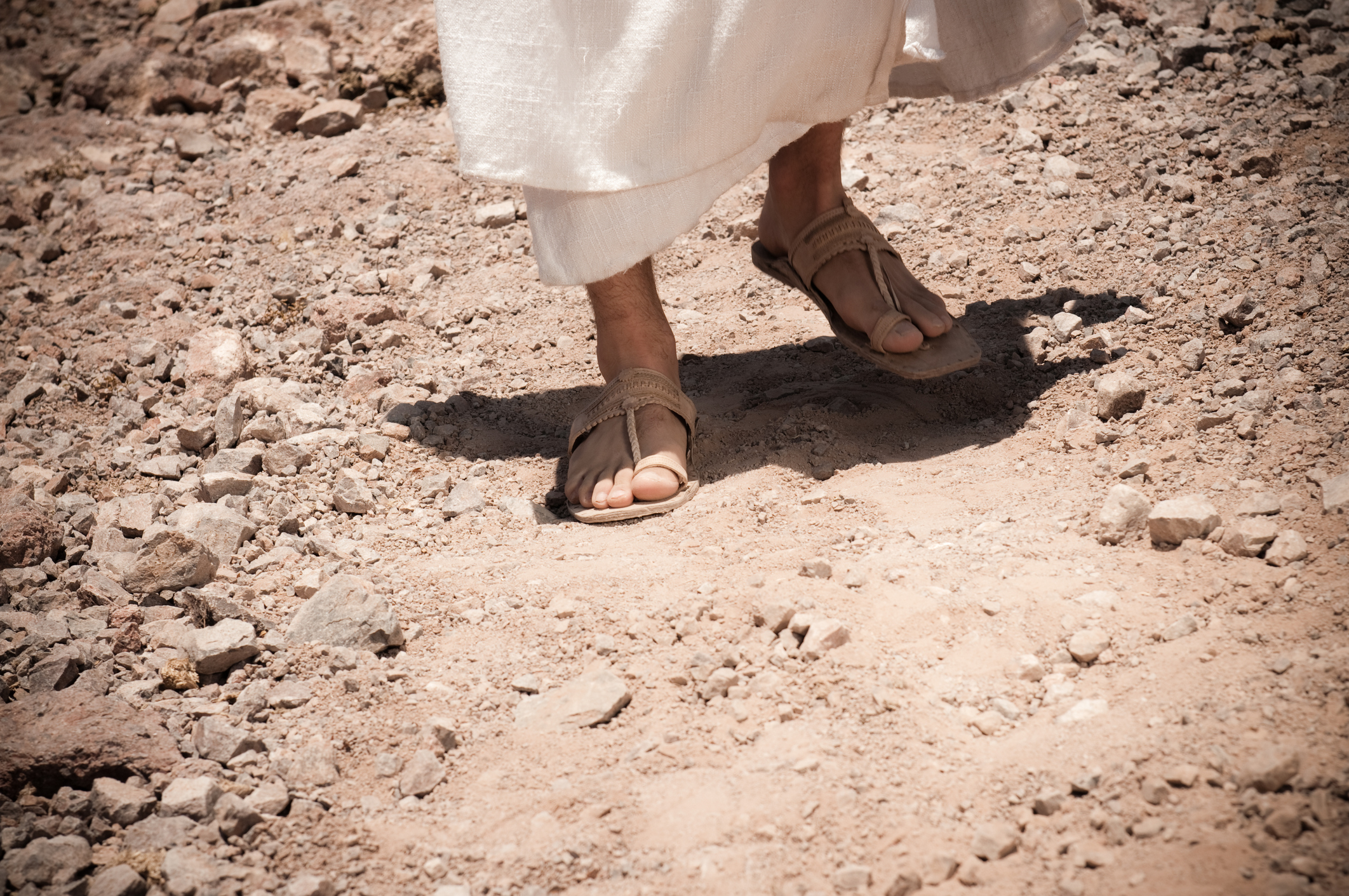This essay first appeared in our weekly Scripture reflection newsletter on July 5, 2025.
Today’s Gospel, in which Jesus sends out 72 disciples (or 70, depending on the translation) includes what some New Testament scholars call the “equipment rule.” As part of Jesus’ instructions, he tells the disciples to take “no money bag, no sack, no sandals,” and furthermore, to “greet no one along the way.”
It’s an unusual set of marching orders, which can be better understood by considering the cultural mores in Jesus’ time.
To begin with, no “money bag” meant that the disciples would be completely reliant on those among whom they are ministering—and of course on God. As a more contemporary example, these days Jesuit novices in many U.S. provinces are sent on a “pilgrimage experiment” with just $25 for a week or two. They are expected to beg for money to help them reach a destination of their choosing (usually a far-flung pilgrimage site) and then return to the novitiate. It’s not only about living simply; it’s a lesson about relying on God. And for Jesus’ disciples, staying in the lodgings of people in the area would also lead to a deeper and more personal connection with them. Likewise, the “no sack” rule would mean there would be no way to carry any bread or other foodstuffs, and therefore betoken a further reliance on others—and God.
Remember, Jesus says that he is sending them out as “lambs among wolves.” That is a vivid image of vulnerability.
Let’s skip to the last instruction—“Greet no one along the way.” At first glance, this seems rude, doesn’t it? In my time working in Nairobi, Kenya during the 1990s, you greeted everyone that you passed on the street with a hearty “Jambo!” Not to do so or, at the very least not to make eye contact, was seen as a breach of etiquette. But in Jesus’ time, a greeting might have meant being invited into a person’s house for a drink or a meal, which would have taken time. So the emphasis here may be on the urgency of the mission. In other words, don’t waste time by going into people’s houses for a “greeting.”
But what about “no sandals” and in Mark’s Gospel, “no staff”? Well, this meant that there would be no way for the disciples to avoid snakes and insects as they trod the dusty paths of Galilee and Judea. More pointedly, they would not be able to run away from the threat of violence, and without the thick staff that travelers carried, they would not be able to defend themselves against animals or the kinds of robbers that we read about in the Parable of the Good Samaritan.
Now, remember, Jesus says that he is sending them out as “lambs among wolves.” That is a vivid image of vulnerability. Imagine placing a defenseless lamb in the middle of ravening wolves. And if you can imagine that, how much more could the disciples, who regularly saw flocks of sheep. And wolves.
Here is where we learn something about Jesus’ approach to opposition. First of all, he expects it. He’s no fool.
Here is where we learn something about Jesus’ approach to opposition.
First of all, he expects it. He’s no fool. A few years ago, a Jesuit preaching during a retreat said that when Jesus asks us to pray for our enemies, it means that he assumes you would have enemies. Here, he assumes there will be fierce opposition to his message of love, mercy, peace, compassion and forgiveness.
And what’s the proper response to opposition? Well, there is a kind of independence required, a freedom, an “indifference,” to use a Jesuit phrase. You say “Peace” to someone, but if they don’t return that greeting then the peace will “return to you.” Notice he doesn’t say “Force them to accept it.” And if a town doesn’t receive your message, then you “shake the dust off your feet.” Again, notice he doesn’t say, “Burn the town down.”
In his book The Most Important Words of Jesus, the New Testament scholar Gerhard Lohfink goes even further. He focuses on the lack of a staff and sandals and says that it points to something else: “Forbidding someone to carry a staff presupposes, of course, that Jesus’ disciples do not carry a dagger or a short sword either…. Likewise, someone who is barefoot is not only unable to flee but cannot fight. So in this context we should speak not just of defenselessness, but nonviolence.”
In this context we should speak not just of defenselessness, but nonviolence.
What can we learn from this today? Well, we all face opposition in our lives, and sometimes it can seem like LGBTQ people in particular face opposition almost everywhere. For me, the last few weeks have seen a dramatic increase in nasty comments, personal attacks and all manner of hateful responses online. (And in person too: Our Outreach retreat for LGBTQ people attracted a handful of protesters, apparently protesting the idea that LGBTQ would pray.) What’s the response? A close friend in LGBTQ ministry said to me, “I go through waves of wanting to quit and take a blowtorch to the world!”
Unfounded opposition, however, is to be expected, as Jesus says. And our response is a gentle one: shaking the dust from your feet is an almost soundless gesture. Not having our peace returned also calls for calm and quiet acceptance. Any condemnation (as Jesus says in this passage) comes from God, not us. Above all, as Father Lohfink points out, our response is always nonviolent. So today, we need to be open to reasonable critique, but also to expect contempt, rejection and even hatred.
But here’s the point: we continue confidently! And like the disciples, who return “rejoicing” with stories of the fruits of their ministry, we find that we can do so much if we follow Jesus—even in the face of opposition.



